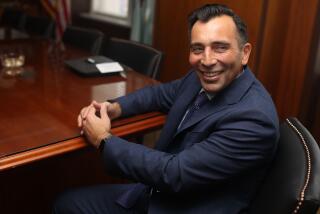Bill Honig Waits to Tell His Story
- Share via
SACRAMENTO — Tall and thin, with long arms and a bony, bespectacled face, Bill Honig belongs on a Norman Rockwell canvas--a caricature, say, of a flinty New England schoolmaster, rod in one hand, primer in the other. He was, in fact, a schoolteacher once, and this shows in both his speech and his bearing. Bill Honig doesn’t converse; he lectures. He doesn’t ask questions; he gives answers. There are those up here who will suggest that these tendencies are what led him into trouble.
Monday morning found the California superintendent of public instruction in Department 19 of the Sacramento County courthouse, awaiting trial on four felony conflict-of-interest charges. It is alleged that Honig illegally routed taxpayer money into a nonprofit education program run by his wife. Conviction will cost Honig his position as public schools chief and, quite possibly, his freedom. It also will undercut his decade-long crusade to reform California’s schools.
These stakes, however, did not seem to weigh heavily on the defendant. Honig surveyed the courtroom with an expression of bemusement. Over there was the prosecutor who wants to send him to prison for five years. And there, in the gallery, were the reporters who came to watch another wayward politician go down, who in not-so-discreet whispers spoke of cooked gooses and possible successors. He studied the scene for a moment and then pulled from his attache case a copy of American Educator magazine. Lips pursed in concentration, he read until the judge was ready. Then Honig put away the magazine, for later.
“The devil,” he remarked to his attorneys, “must be served.”
*
Trials are contests in storytelling. To the prosecution, the case against Honig is a simple little tale. Honig approved contracts that sent state funds to his wife’s nonprofit Quality Education Program. With this seed money, QEP grew and eventually paid Nancy Honig a nice salary. Whether Honig intended to line his pockets, whether the program had merit, are not important. Honig approved the QEP contracts and had a stake in them. “That’s what a conflict of interest is,” the prosecutor told the jury, “plain and simple.”
Honig’s attorney, Patrick Hallinan, seeks to tell a larger, more complex narrative. It is about “Bill Honig, the man,” a scion of a prosperous San Francisco family who left a law career to teach “in the slums.” It is about a reform movement--and program--built on the premise that public schools will be saved only when parents are enlisted in the effort. It is about enemies Bill Honig made as a relentless advocate for schools.
Unfortunately for Honig, many of the stories Hallinan wants to tell have been deemed inadmissible. On Monday, whenever Hallinan started to discuss Honig’s background or QEP’s successes, the judge would send out the jury and admonish the attorney. Don’t talk about “creationism,” don’t talk about “conspiracies.” Don’t talk about Bill Honig, the man. “What difference does it make,” Judge James L. Long said, “if he . . . went off into the slums?” Talk about the contracts, the facts.
The more minimalist the narrative--signed contracts, canceled checks, W2 forms--the more the case seems to favor the prosecution. Without an explanation of motives, what might be dismissed as a well-intended mistake, a lapse, instead starts to look like crime. Not highway robbery, certainly, not embezzlement or fraud. Just a little felony, a technicality. Of course, one little felony conviction is all that’s required to ruin Bill Honig.
*
A popular interpretation of the Honig affair making the rounds here is that Honig is neither crook nor martyr. He is, rather, a public official who committed an act of criminal stupidity, who either out of arrogance or disinterest didn’t listen to the right advice, didn’t ask the right questions.
The word tragedy is voiced often in this version. It is said to be tragic that Honig, a man who everyone agrees never stopped working for schools--a man who achieved solid successes for one of the state’s most imperiled institutions--is looking down the barrel at five years in prison. It is also tragic what this could mean to public schools. At a time when much of California seems poised to abandon them--to more and more divert both children and money to private schools--the last thing they need now is a scandal, especially one that could muzzle one of their best advocates.
Honig, though, does not appear worried. The jurors, he said outside court, will acquit him “once they hear our story, and they will.” The trial he dismissed as a distraction, a brief delay in his ceaseless battles on behalf of school reform. I am sure such optimism is required of anyone who has plugged away for public schools as long as Honig. I am not sure, in terms of the man and his immediate situation, and of the schools, that it is well-founded.
More to Read
Sign up for Essential California
The most important California stories and recommendations in your inbox every morning.
You may occasionally receive promotional content from the Los Angeles Times.














